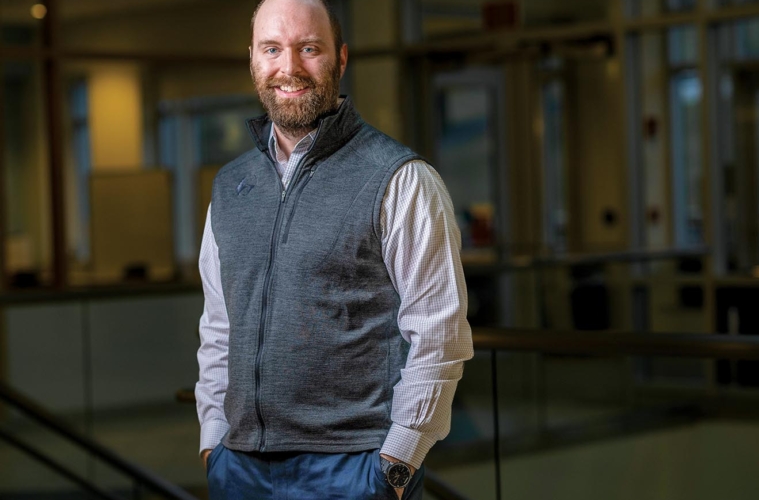The trend toward sustainable investing has been growing, according to Forbes, making it one of the “Top 10 Investment Themes for 2023.”
As a quantitative investment analyst with Arjuna Capital in Manchester by the Sea, Mass., Karl Fries ’10 focuses on sustainable investing through companies that value environmental responsibility and social justice.
At Colgate, he majored in physics and minored in applied mathematics. “I always enjoyed using math to apply it to a system and figure out how it works,” he says. After graduation, Fries interned at an investment management company in San Francisco. He then moved to Boston because a Colgate connection led to a job with Putnam Investments’ Global Asset Allocation Team. “That’s where I started to learn a little bit more about these issues around sustainable investing,” he notes
Fries has long had an awareness of the effects of climate change because he’s originally from California and witnessed the effects of droughts and other environmental issues. He also grew up appreciating the environment through activities like skiing, hiking, and backpacking (at Colgate, he led trips for the Outdoor Education Program).
As Fries began to learn more about sustainable investing, it seemed like a natural fit. In 2015, through another Colgate connection, he joined the finance department of the Appalachian Mountain Club and worked at the nonprofit conservation organization for almost seven years. Still, “In the back of my mind, I always wanted to go back into the investment management industry,” he says, “doing something meaningful for me personally, helping improve business practices for the environment and society, but also working on the complex systems of capital markets.”
He went back to school, earning his MBA at the Yale School of Management, where he focused on sustainability and private investments. “I learned a lot about how companies are using sustainable business practices to reduce waste, for example, and how practices around their labor force affect a company’s value.”
Today, working at Arjuna, he says, “the pieces of my career path all came together.”
Explain your work at Arjuna.
“We’re investing in the world that we, and our investors, want to live in. We’re looking for companies that are going to be doing well in the markets to provide a return for our investors, but also those companies that do good things for the environment and society, either through their products or how they operate their businesses.”
How do you ensure that a company is environmentally and socially conscientious?
“A lot of research. We look at what they say they’re trying to do and also look for follow through. The time scale is a little different — a lot of financial analysts or investors are looking at things in days, months, or years, these social and environmental issues have much longer time periods. In the end, that longer time scale is what we and our clients are focused on.
“The perfect investment for us would be a company that has great economic prospects and is doing well on the environmental and social side of things but may have room to improve. Our team engages with management or their boards, pointing out [for example], ‘You should have more disclosure around your racial and gender pay equity practices. That disclosure is important for us as investors, to understand the risk of pay inequities in your company, but it’s also important for your customers and employees to understand this information.’ We look for companies that are doing well but could be doing better and could benefit from our engagement. That way, we both help the company improve their practices, but also, it’s good for our investors because, over time, with more prudent environmental and social stewardship, those companies will be around longer and they’re going to better manage their risks.”
How is the current economy affecting your work?
“The energy industry is the only sector of the market that’s up. Sustainable investing means different things to different people. If it’s just divestment [an investor] would be really hurting in an environment like this. But, if you’re talking about sustainable investing, divesting from fossil fuel companies, and integrating how you look at sustainability into how you look at companies, it can help make up for instances where you might be behind in a market environment.”
Fries is married to a fellow outdoor enthusiast, Megan Powell ’12, and for their honeymoon they camped in Acadia National Park.

